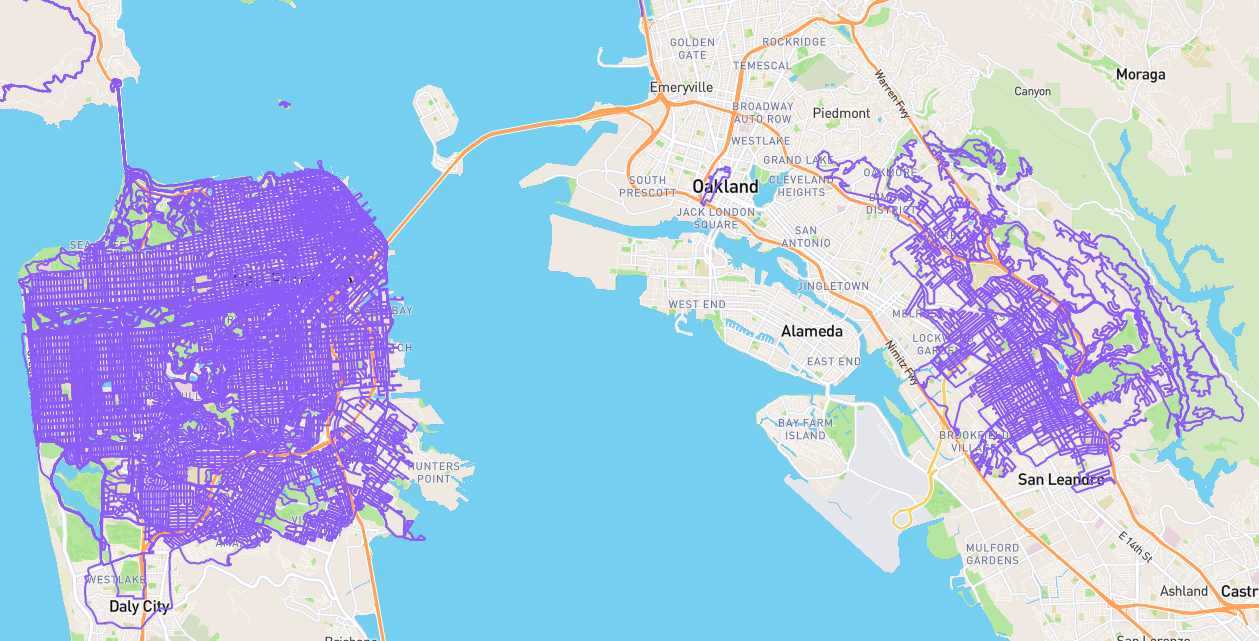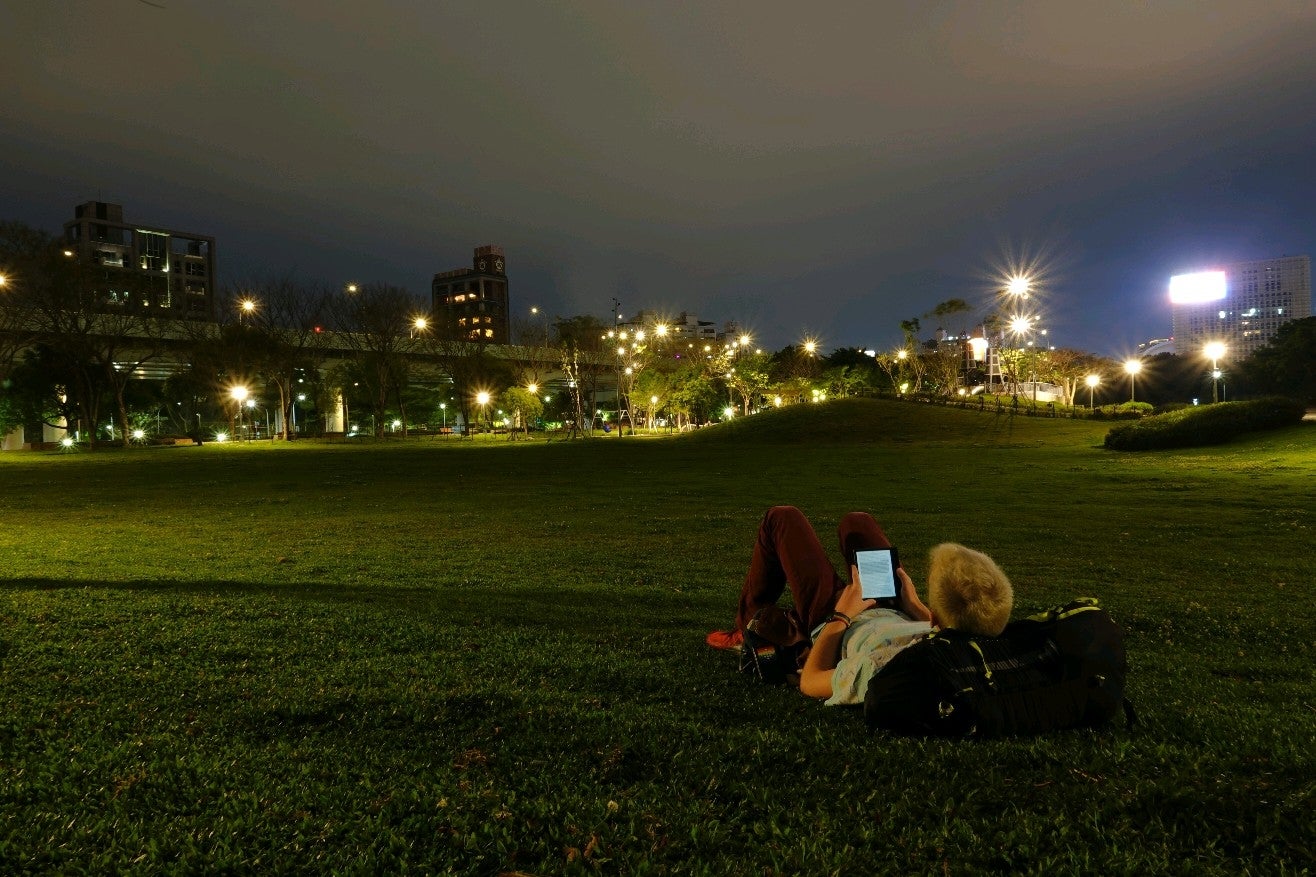Mania de mayo
I haven’t written much for a few weeks, but I’m still here. I’ve mostly been trying to focus on the programming projects and not worry about the brain exercises and other tasks, hoping this would be temporary, and soon I could get back to progressing on everything. But of course I have had diversions, both intentional and unexpected. This month my mind has been on relationships. First, romantic ones, and then for the past ten days, on a friend in need. It is on the latter I now write.
When I visited San Francisco in December 2011, I connected with someone I knew from Myspace years prior but had never met. He invited me to lunch at his office. I don’t remember the conversation, but we kept in touch. Come May, I began my San Francisco life, and he invited me to his regular brunch with friends. We started hanging out. I also got along well with one of his closest friends. It seemed settling into this new, crazy city wasn’t going to be so hard after all.
Through the following months, I grew to know more of them. Coincidentally the brunches died out shortly after my arrival, but I went on some weekend trips with assortments of his friends. I developed a curiosity driven relationship with him, and also a deep affection for the best friend. There was often drama, and not just due to my crush. He was certainly loved by his friends, but he also had a way of annoying or even alienating people in the moment. To me it seemed like selfishness, but I doubted my judgment given those who have known him longer seemed accepting.
One weekend a few of us went down to a friend’s family estate to swim, play games and relax. It being almost four years later, some particulars elude me, but I remember he had worn out just about everyone’s patience. Numerous petty issues arose when he insisted everyone would be happier doing what they did not want to do, or when he argued about why he should be able to do what he wants to do. He would monopolize conversations, sometimes to everyone’s great delight, but also in a way that could exhaust others. He did things he was specifically told not to do, like reconfiguring the fancy multimedia system trying to connect some device. Not only was that unsuccessful, but the entire system ended up nonfunctional, and thereafter it was a major point of contention that resulted in us not being welcome back. Granted, he expected his actions to be reversible, but why was he OK with blatantly disregarding the instructions of a friend whose family was gracious enough to host us? There were laughs amid the drama as well, and it seemed like the group was accustomed to this behavior. But I wondered if he had any clue at all what he was doing.
Later a different group of us went hiking, and we tented together. There were mushrooms, and we all had a great time around the fire, laughing at everything and ourselves. We played with lasers and cameras, discussed his endless ideas, and eventually, relaxed. When our energy faded, we retreated to sleeping bags while conversation continued. I mustered the courage to speak of the group dynamics I observed over the months, and it became clear he was scantly aware how detrimental was his impulsive inconsideration. That was a tough conversation.
As a newcomer I had the authority of a nonvoting board member, but I shared my perceptions. He hurt people, but they loved him enough to maintain the friendships, though unduly strained. To me it seemed just a few small repairs could make everyone much happier. Of course, change is relative, and even a simple habit can be challenging to circumvent; if that thing is part of your personality, part of who you are, then it might be understandable if your friends did not confront you about it.
He pressed for counsel. I gave such advice as I could. “Respect the time, property and wishes of others. Pause to consider how others might feel. Avoid incessant topic changes without letting others contribute. Look for signs others are agitated, especially due to something you did.”
We can all improve, of course, but my disclosure clearly stung. It was not so much my assertion he lacked conscientiousness and was damaging his relationships, but that he was hurting his friends. Years later I am starting to understand this distinction lies at the core of his struggle to be well.
His response to criticism generally, as it was then, is to either ask how to make the problem go away or ask what he should do differently. That sounds reasonable, but his intention is misguided and manifests as him being almost combative while ostensibly asking for help. He does not seem interested in the root of the problem, but only in how he can minimally change his actions so they pass the test. Couched in terms of caring for friends, he almost impersonally determines protocol for next time, deflecting focus from the hurt already inflicted. The plan replaces the apology.
It did not help that next he confided his romantic desire, after which I delicately conveyed my contentment with our current friendship. I am not sure what spurred the question at that point; I can only imagine he felt crushed and yearned for comfort. It felt horrible heralding disappointment on such personal fronts, but I was also relieved to clear the air and hopeful he would take to heart my advice. Improvements did follow; so did massive deterioration.
Over the next year, he lost himself in episodes of manic bipolar disorder and was “5150ed,” held involuntarily under California’s Section 5150. I was in Los Angeles for the marathon when this happened, but it seemed he had plenty of support. His hold was continued under Section 5250, and I returned to San Francisco. Friends organized carpools to visit him daily, but I could not join during my first days back due to post-trip work fires, then at-capacity carpools and then an out of town friend’s visit. I generally feel shitty when I need to prioritize work over friends; I felt especially so during that episode. The guilt was somewhat allayed through a brief conversation with him while he used a shared computer at the hospital. He said his stay would soon end and not to despair. No big deal.
I certainly wanted him to recover and come home, but I did desire to get a chance to visit him at the hospital. Once I was able, I learned he would be discharged soon, the day his parents were arriving. Someone with a license needed to meet his parents at the airport and drive them to the hospital to take him home, so I immediately volunteered. I got the itinerary and was anxious to finally be a good friend. The next day, I received a text that the vehicle I was to drive was too small for the luggage, and coincidentally someone else with a car would be down there anyway and could help. I was no longer needed. But after nine days, my friend was coming home.
Just prior to that episode, or quite likely as part of it, he quit his prestigious software engineering job, the job I have to thank for meeting him in a way. It was close to where I stayed in Oakland on that first trip. Had he worked elsewhere, I would not have seen him online so near, and life might be quite different now! I inquired what he would do about money, and he said he was not worried. He said he would get a job at a startup soon. He also sold his condo for an absurdly healthy profit, so the timing was right. I allowed myself to accept his choice to start renting an apartment and quit his job while he recovered.
He tried a variety of medications and doses in search of homeostasis. He was to cease recreational drug use, though he eventually went against his doctor’s orders given his belief he was stable and his mania would remain at bay. I was uneasy about this, but he insisted; at least pot and mushrooms are somewhat mild.
Meanwhile time flowed through our lives ever quicker. For work I went to Tokyo, which set in motion events that would have me move there seven months later. In the interim I met someone who would become my partner for a year, made my first journey to Burning Man and tried to make the most of my remaining time in San Francisco.
My friend seemed to be doing well, though he suffered a mismatch of romantic desire between him and his newest friend. Still, the bit of drama that caused at Burning Man did not stop us all from largely enjoying the ride. After the new guy expressed his desire for a platonic relationship, they continued meeting, but my friend was more deeply affected than he let on. Barely seven months after the hospitalization, I received a single word, early morning message from my friend: “charlie!” Then I received a worried text from the new guy describing what was clearly a descent into madness. My friend would call it an “ascent,” but I am not sure the state is as sacred and pure as that characterization implies.
He showed signs for days prior, while also barely getting sleep. The friends who took control during the prior episode were unavailable. Thus, I took the reins from the new guy, and my plans with my boyfriend turned into something like babysitting, only nowhere near as relaxing. His best friend managed a visit, and I spoke with his distraught mother for 40 minutes. She did not know me, but she begged me to get him to sleep. I wondered how dreadful it must be to receive sporadic calls from your child’s friends a thousand miles away seeking guidance to a problem that may have no solution. This time, my friend was receptive to taking his medication and realized he needed rest. He still had to battle his distracted, relentless mind, and did so for the better part of the night.
That was my first time witnessing his psychosis firsthand. It was fascinating, and indeed, frightening. He seemed nervous but excited and spoke quickly and incoherently. Some thoughts I could follow, others I could not, and most I was sure would not make sense to anyone but him, and maybe not even him. It reminded me of times I was caught in the act, and in a panic tried to demonstrate I was acting reasonably, or at least justifiably. Or of times my sobriety was questioned and I felt compelled to speak as quickly and intelligently as possible, proving to myself my lucidity and to everyone else my inebriation. He was not well, but he trusted me enough to allow my coaxing him to bed. It was a close call. And thankfully the days following were rather stable.
Stable for him, at least. In the worst example yet of his inconsideration, he managed to add a large amount of turmoil to my final months in the city.
A few months into living in San Francisco, two of his friends approached me about replacing one of them in a studio apartment in the Castro. They had been together for years but were calling it quits, and one would leave. The other could not afford the place on his own, and he needed someone to help with his dog. Since I also had a dog, I guess it made sense. I didn’t know very well the one being left behind, but he seemed nice enough and was part of the group. My rent would also be cheaper. I decided to go for it.
Settling in was interesting. Initially I focused on work while he went out nearly every night. Occasionally we would end up at bars together, as we were basically part of the same group, and the city is not that big anyway. I was definitely not as social as him, but we got along. Eventually we started getting dinner or even going out together. But the more I hung out with his closer friends, the more problems I had. (One guy in particular was constantly starting drama with me; he could be a real asshole. It is ironic we drunkenly hooked up some time later.) Perhaps going out together was not the most detrimental. We did not compete for the same guys, thankfully, but I often felt judged for meeting some of the guys I fancied. Sharing a small room with another person and two dogs could strain any relationship. I was a great roommate logistically, keeping things tidy, largely taking care of his dog with little reciprocity and solving many life problems. We did not communicate enough about boundaries or our feelings, though, and for that I am also to blame.
We made a sort of peace and managed fine for more than a year. We even learned to enjoy each other’s company now and then. And even hooked up a couple of times. Yeah. My planned move to Japan set January 2014 as the end date for our household, giving us both half a year to prepare to transition. Most of those months I was occupied with my first Burning Man, getting to know my new boyfriend and dealing with endless work. During the final two months I planned to prepare to uproot my life again and get everything into a storage unit before going home for Christmas, while also cherishing my boyfriend before our scheduled breakup.
After my friend’s near breakdown, my boyfriend and I went to hang out at his house. We were glad to see him doing fine. The night ended early, though, when my boyfriend demanded we leave after my friend dropped a quite unexpected bomb. He said he wanted to get another roommate, and he had already made an agreement several days prior, and that person would be moving in soon. And, that person was my then current roommate and leaseholder.
Why nobody discussed this with me I do not know. Everyone was aware I would be leaving the country soon, yet my friend decided getting a second roommate, after doing fine all year with one, was suddenly so important it could not wait another two months, even if that would mean I would have to move to a new apartment for that short amount of time. Considering how much of a pain it is to find an apartment here, and one that allows dogs at that, I was shocked and enraged my supposed friend would do this to me.
Perhaps I was even less bearable than I thought, and my roommate begged him. Perhaps they all hated me and wanted to make my life miserable. Perhaps my friend totally lacked empathy. I no longer cared. I felt alienated and hurt, and it was time to go.
My boyfriend worked out with his roommate an arrangement where I could stay there with my dog. I was grateful, of course, but felt uncomfortable my newish partner had to negotiate and make space for me, and I resented my friend for causing the whole situation. It turned out all right, though, and that holiday season was the most emotional ever.
I did make a sort of peace with my friend, though I seldom spoke with him during the next year while I lived abroad. I came back for Burning Man, but I drove up and camped with different people. Then when my Japan chapter closed in January 2015, I spontaneously booked a trip around the world and would not return to settle in San Francisco again till fall. While life was in flux, I learned new ways to accept it. I found guidance in several books. More and more I learned to let go of the past. I started practicing being present and not letting events bother me. I have a long way to go, but even those small steps have made me feel much better lately.
Being back has been good. I moved in with an old date turned gym partner turned landlord and love my housing situation and roommates. In an entirely separate story, I quit my job in December have been enjoying finally having time to rescue some projects from spoiling on the back burner. I have struggled to make sure I am being “productive enough,” but I am also happy to have time.
I also saw my old friend a few times. Once we smoked pot and chatted late into the night. Pot is not usually my thing, but with no social situation to make me paranoid, it was enjoyable. We had some abstract, stimulating conversations that may not make a lot of sense to outsiders.
Another time I met him at a restaurant by the ocean while I was on a 10 mile run. Over lunch he filled me in on his life, including how he left his job at the startup he joined after quitting his first job and how he liked a new foreign guy. He was also going to start a new technical job at a public benefit sort of startup. After splitting the check, we walked around Sutro Baths. I had never been there, and it was pretty cool! After that, I told him I needed to continue my run soon. He asked if we could walk a while before he called a ride back. I said I needed to get back home in time for another obligation. He said he did also, so we should walk. We started toward Golden Gate Park, and then proceeded to enter. I decided to forgo my hopes of finishing my run, and instead tried to relax and enjoy the park and my friend.
He seemed well, and at one point he told me about a project he was pondering that involved electroluminescent wire and three dimensional geometry. (He did later complete a demo of it, and it looked cool!) After meandering a few hours, even my friend decided he was going to be late for something, and he almost ordered a car till I told him we were only about two miles from his home. He then decided to continue walking with me up Haight Street to my house. The usual assortments of characters dotted the street where the marijuana’s smell permeates. The numbers of tourists dwindled with the setting sun, leaving some combination of local artists, hippies and the homeless. Some roaming, some static; some in groups, some apparently alone.
I was not alone that day, but I began to feel distance from my friend. He was oddly drawn to the many colorful clothing and costume shops. He said he loved the Haight; it is where the artists are. That seemed odd to me, at least, since I had never known him to hang out there. It is where I live, but I would not exactly call it my neighborhood. There is a chasm between my block and those surrounding, but sometimes I enjoy the extra flair living in the Haight seems to connote. I do think it is great my friend is getting in touch with his artistic side and exploring, but I am not sure what inspired him, and I am not sure how much I can still relate. He has always been curious and a tinkerer, like me. I guess with the Burning Man culture it veered from mostly technical projects into the realm of self expression. Does he yearn to express himself, some part of himself that is different than before? Is he moving on to a new, accepting crowd and way of life, or just expanding his horizons while still saving space in his heart for his old friends?
It was not long before he messaged asking if he can use my expensive digital SLR camera, and then if I could show him how to do long exposure photography, and then if I could go to a class with him and help him with some pictures. I told him it sounded fun, but I was busy, but he was welcome to use my camera. (I do not mean to imply this in itself was some grand gesture. I have previously lent out the $5000 device to a one night stand; after miraculously un-losing it in China, I am happy to pay it forward.) He said he would pick it up when he passed by the next day. He did so, and stayed to work briefly on his laptop. He said he was quite tired, so he took a nap in my bed while I worked. Later his alarm sounded. He asked how to use the camera, and then he left. It was refreshing to hang out without him expecting a huge investment on my part, and I recalled other enjoyable times in 2013, when he was actually progressing on his own projects.
Sometimes I wonder if I set myself up for failure with him by being so interested in projects generally. He has plenty of friends who can discuss random ideas, but most of them are not as technical as me. I therefore have tended to fill roles others could not, helping him implement projects and painting a picture of what is possible. The problem with technology is anything is possible with enough effort, so my burden as his friend often varies inversely with my guilt. If something might take a hundred hours to solve, I have to say it is too hard or I do not have time, and endure the disappointment. Why can our friendship not simply be based on mutual respect and love?
We next hung out some weeks later, just a few weeks ago, during a movie night I hosted. We watched Interstellar, which again provoked some lofty conversation. Aside from the ideas exchanged, though, my friend was in a peculiar mood. He was quite scattered, having come to my house specifically so another friend could fancily handwrite a letter to be included with a bid to purchase a house the following morning. Only he forgot the special card he bought for this purpose, and needed to go back to his apartment to retrieve it. The movie was in progress when he arrived, causing an interruption that turned into a trip to the corner store for treats because I am insatiable. But then he kept trying to get the group to cancel our already started movie plan and go to his house – convenient for him since he forgot the card. After some squabbling, he consented to order a ride himself and meet us back at my place, and we continued the movie. When he returned, he worked on the card for the next two hours, maintaining a conversation in the back broaching a slew of lines of thought. He continually repeated themes of love, empathy and reciprocity. He also railed on big banks for their lack of compassion, holding they do not deserve business, as if they are not made of people, too. He wanted help securing new funding from a small bank that cares, immediately. He insisted he would succeed because it felt so right to him and therefore the universe would make it so. It did not matter his bid would likely be hundreds of thousands of dollars lower than others; if the owner were a good person, money would not matter. Sometimes I get yelled at for asking for clarifications during a movie; he was talking endlessly about topics unrelated! I did not mind so much, for at least I still managed finally to see the film. I had been holding out for months till I could enjoy it with friends. And my friend was clearly anxious about the house, so I wanted to be supportive.
After the movie, he went home so he could sleep and rise early to deliver the pleading card. One who remained asked about the odd behavior, which incorporated disrespect and preachy optimism. I did not realize till that point just how bizarre my friend must have seemed. I made allowances considering the gravity of the real estate purchase, and I suppose I had grown accustomed to his personality, as with the others when I first observed his indiscretions years ago. I recapped his history of mania to provide context and tried decocting his struggle to be well. Through imagining the mind of another, this new friend nearly slipped into his own mild breakdown. Maybe we were all fatigued and warped by Interstellar, but there was a good hour of uneasiness that would later have me wondering if psychosis might be contagious.
The next day I learned my friend had not slept, which was no surprise but made me think better than to inquire whether the offer was accepted. It turned out it was not, despite his crotchets regarding the motives of the universe. I hoped he harbored no negativity toward the seller. I hoped his crushed dreams and invalidated beliefs did not sink him into depression. I hoped he understood we are only human.
Two weekends later we met again to celebrate his old best friend’s birthday in the park. That friend’s boyfriend organized the outing with us over Facebook, which took some effort due to my friend being difficult. I think he meant well, but he was agitated we did not jump on his idea to use some external service for picking a day. Once the four of us narrowed a list of dates the old fashioned way, he made several attempts to bring the party to him, to events he was already attending. He did point out he felt the birthday boy would enjoy them. At long last, we settled on a Saturday picnic with just us. Simple, relaxing, perfect.
The birthday was great. After eating we wandered the park, discussing random topics, including some in biology and physics. It was nice to contribute with some minor authority for once. I talked quite a long time with my sometimes psychotic friend, and after the others headed home, we continued, again walking home through the Haight. I did need to get home, but I also wanted to spend more time with him. Some of the conversation was a reflection of the past. I explained some of the practical issues with ideas he proposed, though I made clear my belief they had merit and might work given certain societal preconditions. He did not like his ideas to be rebutted, as is natural, but we maintained a pleasant attitude. We passed a series of sidewalk chalk writings, and one read, “Make out for 10 seconds.” He asked if we could make out. I asked if only five seconds would be OK. His approach was softer than expected. We stopped at Whole Foods because I craved some sort of brownie, and I was quite surprised my friend purchased two boxes of them himself. He said he wanted to share with people at the co-op he was planning to move into, which was the first I heard of this. I devoured one outside as he struggled to redistribute the two flavors in the boxes before we forged on.
We made it a block or two before he saw a giant, fancy bong in a tobacco shop window and felt compelled to ask how it was created. I appreciate his childlike curiosity and lack of inhibition. Were I able to replicate it, I know I would be better able to connect with people, to live more in the moment. But sometimes he seems to not know, or care to know, whether the other party has any interest in fielding his queries or even the ability to do so. The middle aged man behind the counter seemed to hear the question but know not how to respond, and then the phone rang and he answered it. After a few seconds, my friend lost his patience and as we left complained how rude it is to take a phone call instead of talking to someone who might have become a paying customer. I offered an alternative view and suggested not being too hard on the stranger.
Next he pulled me into a tattoo parlor where he had previously inquired about an anodizing machine they were purchasing. We waited in line while the employee answered questions for anxious prospective customers. After ten minutes, another employee appeared, and my friend asked him about the machine. The guy said they have the machine, but since they are not a teaching shop and it is new for them, they would not be comfortable letting him use it. My friend said he would research on his own and use his own supplies, but still they said no. I thought they were pretty cool in explaining what they knew of the process and even suggesting another shop that might allow him to use their machine. They also mentioned it was fairly easy to build one at home following online videos. My friend persisted a bit more, and then we left. I was not sure if he felt slightly embarrassed for having pushed the clerks past their comfort level, but he probably did not even notice. His mind is usually on his desire and not on the desires of others. It was not a big deal, at any rate. As we walked, he remarked how cool they were, and I agreed, offering they were very nice and surprisingly knowledgeable.
He wanted to stop at that other tattoo shop to ask about their machine, so I told him I would part ways with him once we arrived because I really needed to get home. He said that was fine, but first we should walk back a bit to see if we missed one of his favorite stores. It wasn’t the right one, so we continued on, and then we said goodbye. I gave him a hug and said I had a great time hanging out, and I meant it.
Over the next couple of weeks, we conversed online about some home automation plans he wanted to implement at his apartment before moving to the co-op. He said he wanted to do it for the roommates he was leaving behind, one of whom is the former roommate of mine who will not talk to me to this day. I was not eager to bend over backward to make that guy’s life more convenient, but I offered what feedback I could without spending more than an hour on research.
Then last Wednesday, I received the same single word, early morning message from my friend, this time in all caps: “CHARLIE!” It was soon followed by a series of messages from a new guy my friend had been dating and who tried to buy the house with him. He described a “rather harrowing episode” in which my friend was “talking incessantly and sometimes not making sense, obsessing on numbers, symbols, and shapes and getting very agitated. At one point he started yelling and I called 911.”
I messaged my friend and asked him to come to my house right away. I got in touch with his old best friend, who had become one of my best friends as well, and whom I was excited to visit that night to see his new apartment. I suggested I bring our mutual friend as well that night, and we could talk about what was happening and hopefully play some games and maybe even relax. My friend then suggested he bring the guy who was with him the previous night, for they were supposed to be celebrating that guy’s birthday, but my friend’s mania stole the spotlight. Then he said we should meet at that guy’s house. I pointed out that would defeat my plan to see his best friend’s new apartment, but we eventually settled on meeting at the new guy’s place. And then my friend said we should also go to some café beforehand, and also go to an event at a bar afterward around 11. I more adamantly proposed we simply meet at the guy’s place and deal with this escalating manic episode first and foremost. I got some flak, but then it was agreed to meet at his apartment at 8:30.
I spent the rest of the afternoon doing some general research and compiling my friend’s mental health history from four years of messages with a dozen people on five platforms. (Gotta love technology!) I went to the new guy’s apartment early to discuss what happened in more detail. Then we heard my friend had fallen off his motorized skateboard and was being given first aid at a massage therapy school. This injury was in addition to a puncture wound from the weekend that he refused to have stitched since he thought the scar would look cool. His best friend met him, and then they came to the apartment together.
He insisted I go to the market to get a specific ice cream he wanted, but I was already getting frustrated and mindful I should not be playing into every scheme of the manic mind. When they arrived, my friend was limping, bandaged in multiple places, and his foot was swollen. He wanted to shower, so two of us consented to go to the store in the meantime. Once back, he said someone was going to be buzzing up to give back the SIM card from the phone he gave away, leaving my mentally questionable friend without a mobile device. I really did not want to turn this into a party and avoid the hard conversation; my friend agreed to meet the guy downstairs. It turned into a long ordeal involving trips to find a SIM card ejector, but eventually the four of us were back and ready to hang out, sometime past 10.
The atmosphere was like that of visiting a friend in the hospital. He was clearly the center of attention, and we tried to be sensitive to his needs. But we also tried to be mindful of when placating his desires would likely escalate and make things worse. We eventually had some of the discussion for which I was desperate, interspersed with a television show and a video game. It was difficult, partly because when he is manic he changes the topic even more than he normally does, but mostly because his idea of being well had fundamentally changed.
He had stopped taking his medication some months ago, and he knew full well he was becoming manic. He felt alive and excited about life, and the drugs only took that away from him. (This is an interesting reversal from when he first started treatment for possible multiple sclerosis, and the medication brought him out of a long period of depression, but might have contributed to mania.) He started looking at his mania as a gift, a part of him to embrace. He denied the injuries were related to mania and said he was free to give away his phone and other belongings and move into the co-op and do whatever he wanted. And while I find the timing of multiple injuries highly suspicious and wonder how he might call for help with no phone, I agree he is indeed free to do what he pleases with his belongings. He is of course dependent on the proceeds from the sale of his condo, which has enabled him to live without a paying job for years now, and I wonder whether his position would change were he actually required to work to support himself.
Before meeting that night, I hoped to help him recognize all the signs of his mania and agree he should get back on the medication to stabilize, and only then we could make a plan. But once I saw he did recognize the mania but no longer saw it as a problem, it became clear medication would not be on the table. I told him I did not know firsthand how dulled he felt on it, and I could not force him to take it. I did break it to him he seemed unstable and I had little confidence he would not become full blown psychotic and put himself or others in danger. He received that news with a pause, and looking in his eyes I could see him trying to convince himself I must not be a good friend if I felt that way. I reminded him how we established our friendship on the basis of my honesty in frankly disclosing frictions I observed him creating with others, and I said I had been seeing the same patterns this year, and he was again failing to recognize the extent to which he drained his friends. More explicitly than he did in the summer of 2012 in response to my assertions, he asked for specific limits to which he could push his friends. I told him I would not spell it out explicitly, that caring about people was not about building formulas for maximum depletion but building relationships based on care and understanding. He was missing the point. He wanted to know how to comply outside without changing inside. I started thinking there may be merit in his previous comment he might be autistic. Or perhaps it was a play for more tolerance, thereby draining us further.
I noticed other worrying developments in this episode compared to those past. He had always been amiable, if determined, and while he never liked to be told no, he was always receptive to caring friends’ suggestions. I had never seen him get violent or hurt himself. But something changed. He was easily angered, raised his voice often and even yelled at me while I was wrapping his swollen foot with sport bandage I brought along with melatonin and hydrogen peroxide and gauze and other supplies in an effort to be prepared for anything. He increased his manipulation and worked into his comments subtle threats to leave, to be with his new, shiny friends who cared more. He seemed to think there was no limit to what people should do for him, and I did not sense any sentiment of giving back in return for such acts of selflessness. I wondered whether this person was a temporary version, a new version or the actual version, finally revealed. I wondered whether he was still my friend.
Through much back and forth, he iterated his expectation he be allowed to be as manic as he wanted to be, and whoever was around him would simply have to support him. He claimed all his new people at the co-op were such good friends they would drop everything and help him. He would not even need to bother to get his wallet from home because someone would love to fetch it and bring it to him across the city. It was apparently me who was the bad friend for suggesting we should have enough consideration to avoid unduly burdening others, especially people we love. My friendship was also challenged on several other fronts that night.
He agreed to see his psychiatrist the following morning, but he said explicitly he was only going because his friends wanted it, and not because he planned to take it seriously. I therefore knew it would make no difference. He did not care about the problem, which he now denies is a problem. The problem is he does not get that I do not see the mania itself as the problem, but rather the behaviors that strain his friendships, and the resulting lack of empathy for the people dealing with the problems he creates. Sometimes I wonder if the mania is a manifestation of his fear of addressing his core issues, issues I and others have tried to help him work through, and probably many more issues of which I am not even aware. I wonder if we could somehow find a way to reach the part of him shielded deep down and let him know it will be all right. I was pretty sure, though, we could not reach him in this state. But doing what his friends thought was best would definitely not extend so far as taking the prescribed medication.
By 12:30, I was exhausted, and the others were, too. Except my friend, who wanted to play more games. I told him it was late, we all dedicated plenty of time to him already, and he needed to get to sleep so he could make the appointment in the morning. He said he would only leave if someone would spend the night with him. I hoped to accompany him to the hospital, but the best friend volunteered to bring him home, so he decided to take off work the next day to accompany him to the appointment.
I walked home via a route I had not yet experienced after midnight. The cold air helped relax my mind, which was racing despite my efforts to remain calm through the night. I wished a good night to the evening’s host, at which point I noticed my phone looked a little strange. The text was not exactly blurry but appeared to multiply and jump around, almost like I was on acid. I put it away as I passed some people exiting the bars and made my way home. I was exhausted but alert. I hoped the others were already fast asleep.
They were up most of the night, but they did manage to attend the appointment, possibly by ambulance. I was more anxious than ever that day awaiting news, which did not come till evening despite the morning appointment. I still felt exhausted and tried but failed to do any work. I was perplexed by the distinct feeling I was high the prior night. It seemed like a fantasy, and I could not help but wonder again if psychosis is contagious. I remembered Oliver Sacks wrote in “Awakenings” about his observations of actors spending many hours trying to put themselves in the shoes of people suffering from parkinsonian syndromes. Sacks said he was struck by how convincing some of the performances were, and how the actors seemed to naturally sort into various categories of nervous ticks and symptoms that are the same categories that characterize real patients. He said he half expected, were he to conduct electroencephalograms and other diagnostics, they would be found to have the syndromes. He wondered what distinguished a real mentally ill person from someone acting with such perception and understanding their brains were functionally identical, and whether the actors might be permanently affected by the experience. I also thought of recent research that showed simply thinking about performing an act can affect brain neurons the same way as actually performing the act, such that effectively there may be no difference to the brain. Maybe the challenging act of genuinely trying to understand and reason with a mentally ill person wires your neurons in just the same way. Maybe true understanding necessitates this process. That sounds crazy, but it is not any crazier than what studies have already shown. This made me hope even more my friend would have a change of heart so we might be able to have a more rational conversation with a slightly more grounded, compassionate person instead of the unpredictable one for whom reason does not apply.
It turned out my friend had broken his foot, became more intensely manic and had some drama at the hospital, and was going to be held again involuntarily. He did consent to taking one dose of medication because the staff was nice, but his opinion remained the same. It seemed he would be held through the weekend, but come Saturday, I heard he was released. It was subtly suggested I refrain from engaging him just yet, but he was doing all right. By Sunday he was already sending me a torrent of messages describing a new technical project he was hoping to complete as soon as possible. He said explicitly he figured out a way to best use my talent, and wanted me to find a camera that met his requirements and get it ordered so it could arrive by Tuesday. In the past, this would have enraged me. He seemed to have forgotten all we discussed, oblivious to how it seemed he wanted not to use my talents but simply to use me. Instead of exploding, I told him the truth, that I needed to focus on my own projects and find a job, as I had been unemployed for many months and unfortunately lost nearly thirty thousand dollars in a bad stock bet just that week. After all he talked about sympathy that night before the hospital, I thought he might have some understanding for my situation. But he does not like to be told no, and instead he questioned my friendship. As a cherry on top, he held it against me that the best friend went to the hospital with him and I did not. He said that friend would drop everything for him, so why would I not help him with the project immediately? I informed him I had not progressed on anything of my own since I spent nearly every waking hour for the past five days absorbed in his issues, reading all the history with all of our friends going back years, and trying to learn as much as possible so I could be as helpful as possible. He said that was great, and I will be able to give even more from then on, and I could start by helping with the project. He said he was ranking his friends, and wanted to know exactly how many hours I would dedicate to him in the next 24 hours. I told him I was glad he was feeling better, but I was sorry, I wanted our friendship to involve something other than my doing his various projects and chasing his changing goals.
It has been a few days now, and I talked to him a couple of times briefly. He said he changed his mind about one thing and would take my sleep tracker I had brought to him last Wednesday. I am not sure if he wants it for managing his sleep or just wants to play with it. He told me I should watch a video he posted that makes the case bipolar disorder is not something that needs to be medicated but rather something that needs to be experienced and worked through. The video said bipolar people are filled with love and broadened personal integrity, but I wondered how that translated to him not telling me that he loves me but asking how I can help him. It said episodes of uncontrolled psychosis would last weeks and require at least two adults to help around the clock, and I wondered how imposing that on unsuspecting friends without discussing it first was really responsible love. I also wondered what that meant for all the people with schizophrenia on the street who do not take medication and have had years to work through their psychosis and still have not magically returned to normalcy, as the video said would happen if allowed. I hoped my friend might agree to read and discuss with me one of the books that helped me so much last year, and for my part I would read “Soteria: Through Madness to Deliverance,” which is about an alternative to psychiatric hospitalization and caring for patients with kindness. He asked why he should read the book. I told him psychosis may indeed be a healing process, but there are other ways to heal the underlying problems that are equally spiritual but require less dedication from everyone around him, and that way he can be a better friend to others instead of needing others to be devoted to his issues. He declined, and thanked me for my concern.
None of this surprises me anymore. When I was an outsider to this group, I tried to help him fix the problems everyone was annoyed and hurt by but unwilling to address. It seems I am now part of that club. I have gotten to know him much more over the years, and I care about him deeply and want him to be happy. But even aside from the recurring mental health issues, we have the same slew of basic friendship issues that he seems uninterested in resolving. If good friendships are supposed to wear me down and hinder me from achieving my own goals and finding personal satisfaction, maybe I am not cut out for it. I am exhausted beyond the point of doing more, in my limited capacity as a bad friend.






















